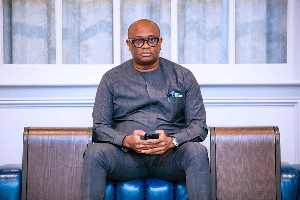AMSTERDAM, Netherlands (AP) -- A middle-aged, paunchy, unemployed white man plops down on the sofa to watch TV with his kids.
Meet King Togbe Korsi Ferdinand Gakpetor II of Ghana.
In Holland, the king is Henk Otte, a Dutch construction worker on welfare. In West Africa, he rules part of the lush Volta Region, home to tens of thousands of Ewes who revere him as Togbe, or king.
Otte, 43, is as Dutch as the Dutch come, born and raised in Amsterdam like his parents. He lives in an Amsterdam housing project with his wife and two children, and an ordinary life would have suited him just fine.
But, during a 1995 visit to the hometown of his Ghanaian-born wife, Mamaa Awo Mepeyo Kpui, Otte was identified as the reincarnation of the late chief, his wife's grandfather.
``My two brothers were there when I was asked to become king,'' Otte said with a chuckle. ``When I translated for them what had been said, they almost choked with laughter: `You, a king? Ha!'''
Now, when his brothers accompany him to Ghana, Otte is carried by throne-bearers and surrounded by cheering crowds. Drummers pound and dancers swirl in a surreal procession that has been shown on several Dutch television documentaries.
The region he rules, about 45 miles east of the capital, Accra, comprises about 40 villages populated by more than 100,000 people. It was leaderless for almost 17 years until the Dutchman was proclaimed king.
The Ewe, a group of tribes that share a common language, account for around 10 percent of Ghana's population of 18.5 million.
According to local lore, the Ewes in the Volta Region originate from the eastern shores of Togo's Aklakpa River. Their first king, according to legend, was carried across the dark, torrential waters by alligators to settle their homeland.
When he is in Africa, Otte wears a crown and monarch's garments and lives in a home built for him.
Otte's attraction to Ghana began as a child, while reading about the geography and history of the region. Later, he says, a Ghanaian fortune teller predicted he would obtain a position of power.
During a visit to his wife's village of Mepe, a spiritual healer told Otte things about his life the Dutchman is convinced the healer couldn't have possibly known. Villagers stared at him, insisting his spiritual ``aura'' reminded them of the late king. He became a magnet for swarms of children and visitors, who walked for days to see him.
One evening, Mepe's leaders told him he was the chosen one.
``They asked me how I would feel about becoming king,'' he said. ``I looked at them and thought: 'You've got to be completely insane.'''
Although he's considering moving to Ghana, Otte is aware that life as a king isn't all fun and games. In Mepe, he is prohibited from eating or drinking in public, he can't shake hands with the thousands of ``commoners'' who flock to his side and is always escorted, even to the toilet.
For now, telephone calls and faxes are the only way Otte maintains a say in community decision-making. He also collects donations to improve the region's impoverished education system and has sent a shipment of toys for the youngsters.
Unlike the scores of foreigners, mostly aid workers, who have been named ``development chiefs'' in Ghana and undergo a purely ceremonial coronation, Otte's is a position with authority.
He will undergo a traditional installment ceremony on the fifth anniversary of his crowning this August, a ritual that can last for weeks.
Otte doesn't believe in reincarnation, myths or spiritual healing. But over the years, he has overcome his Western skepticism and now agrees with his subjects that his appointment was predetermined by a higher being.
``If you think about it, it's pretty weird,'' he said. ``But it's my destiny.''
General News of Sunday, 16 January 2000
Source: The Associated Press












